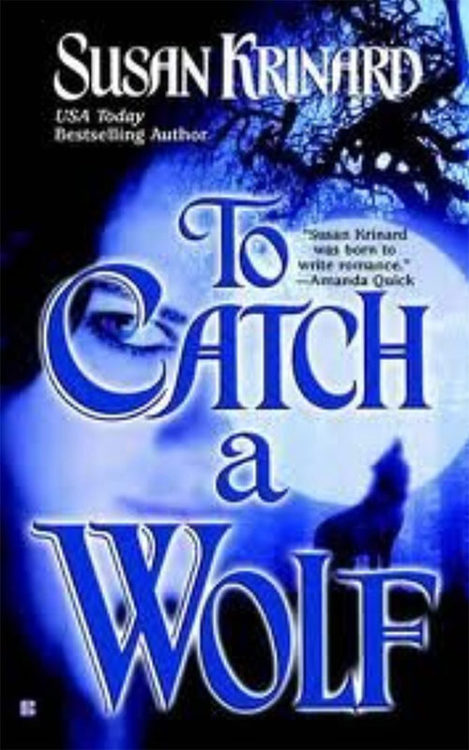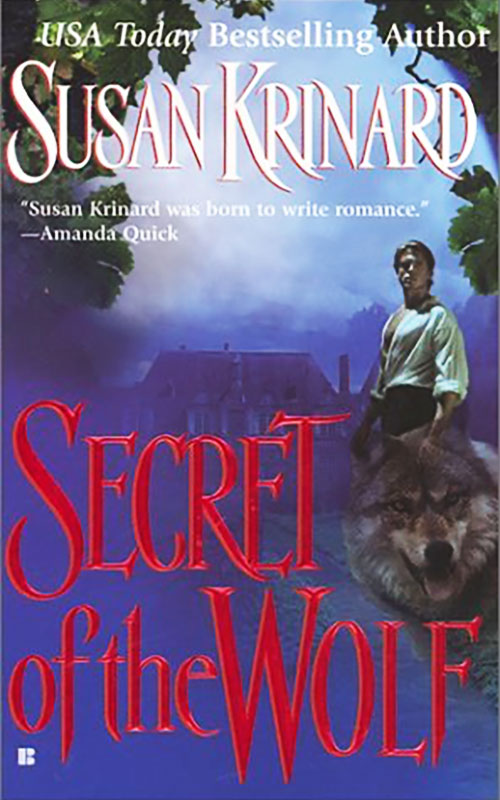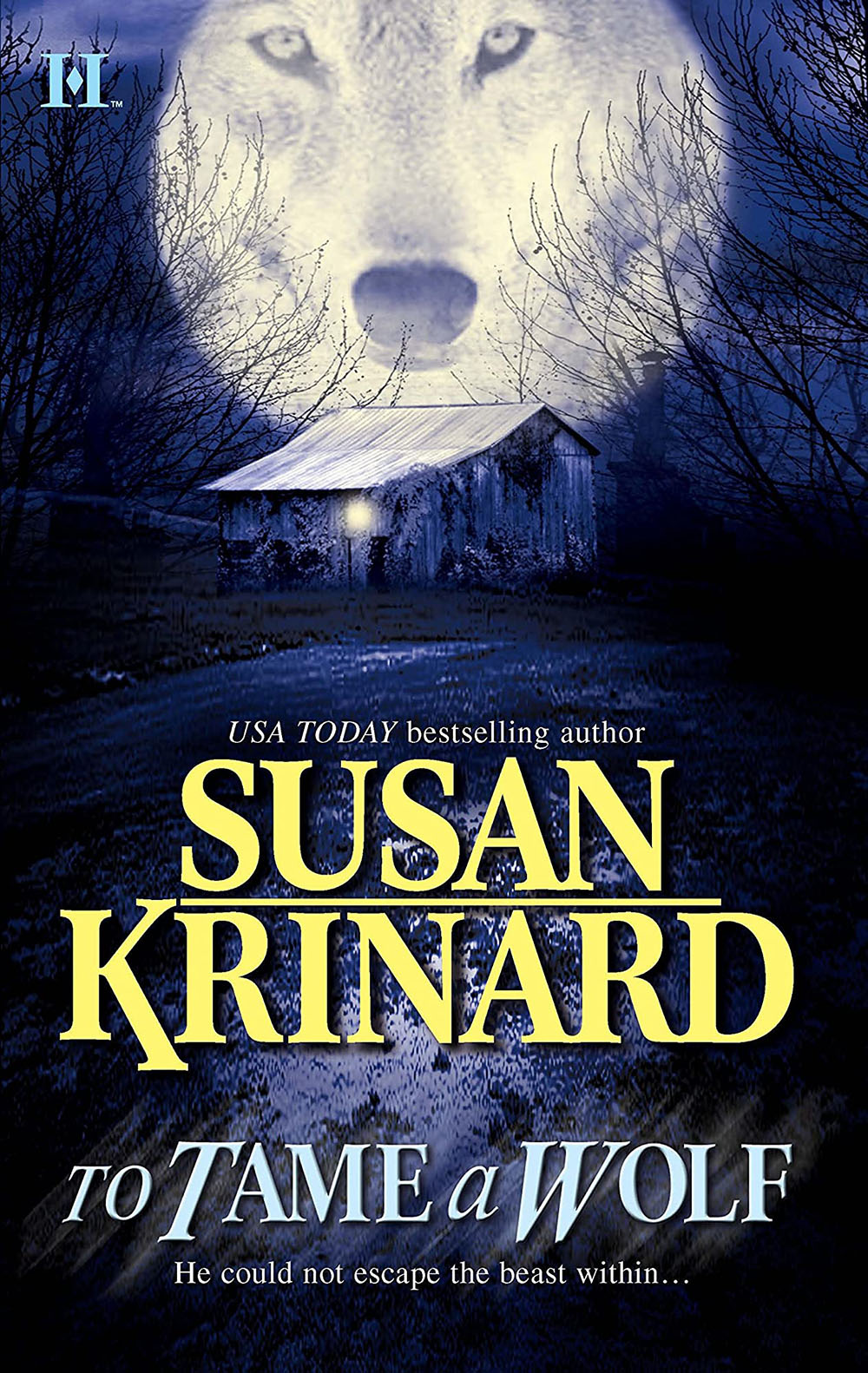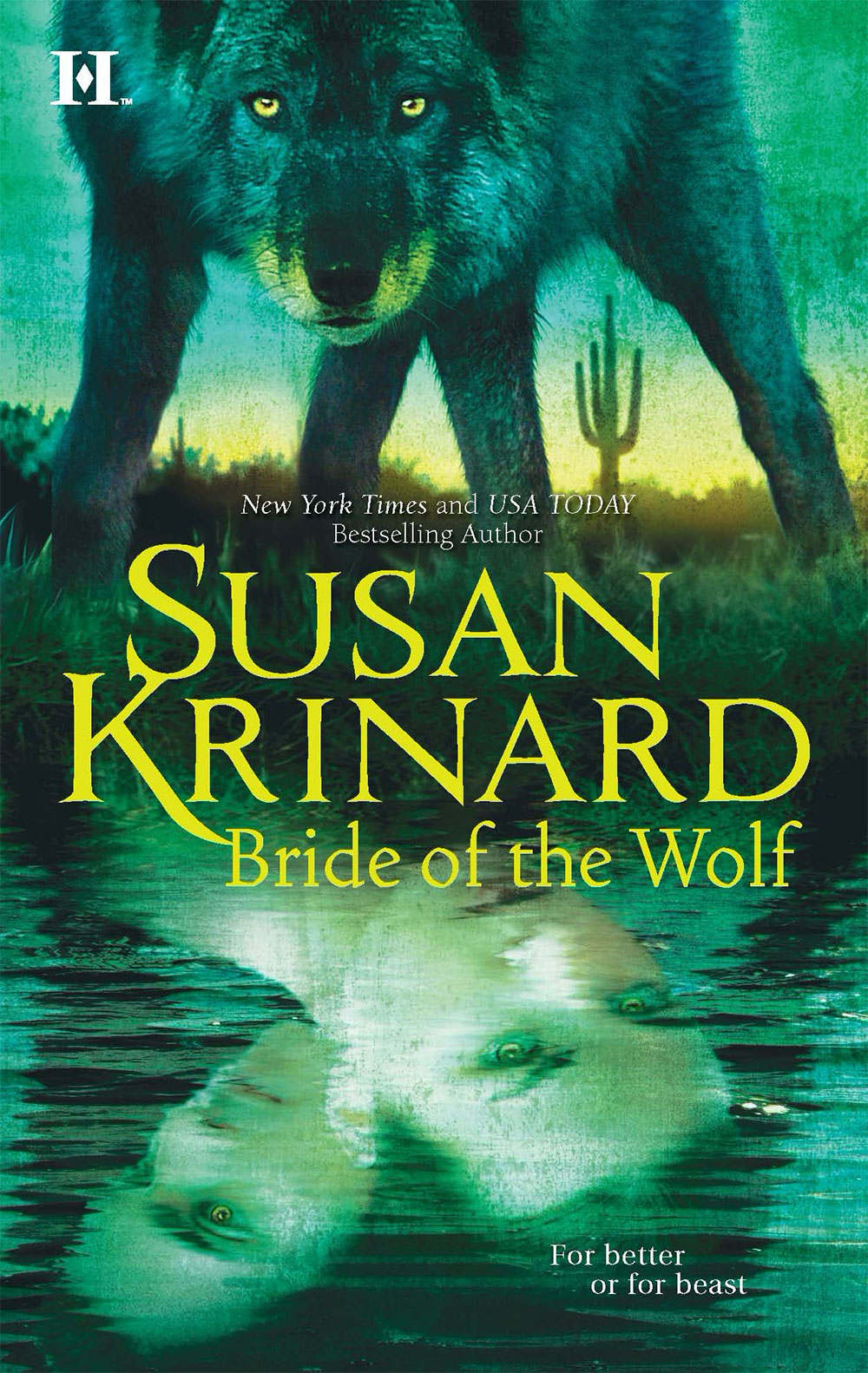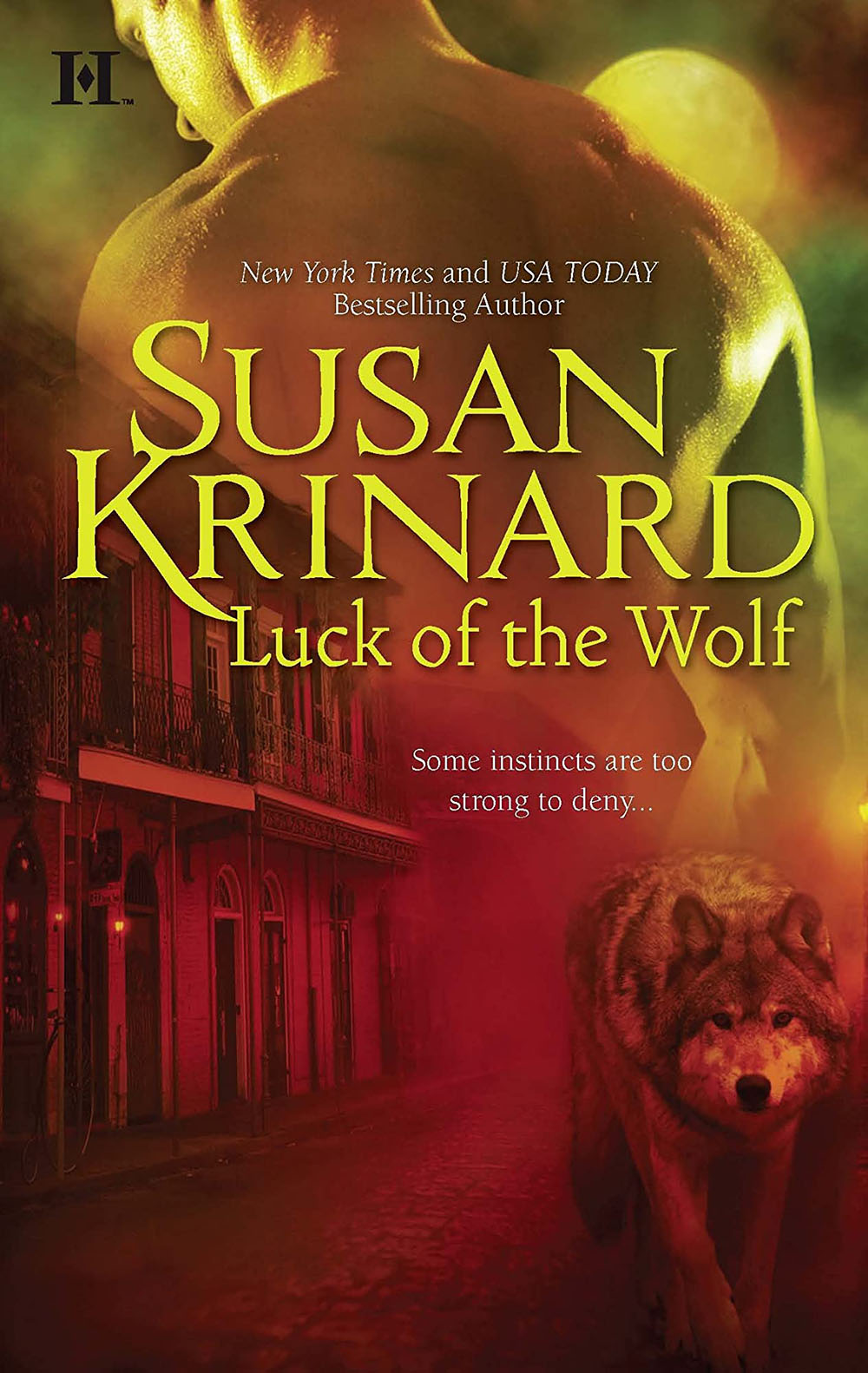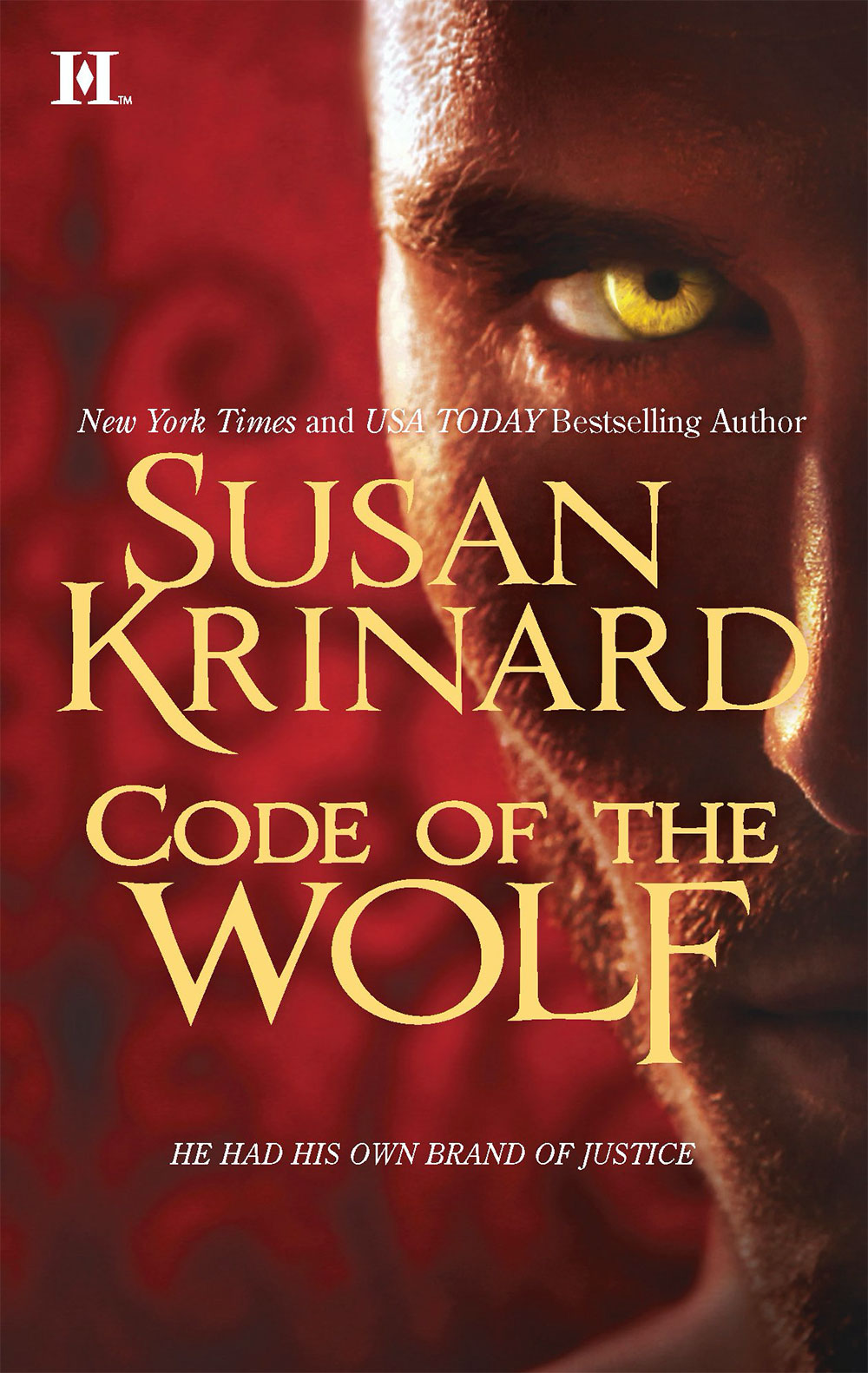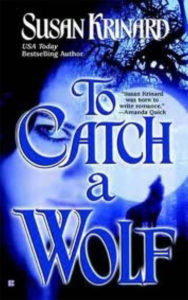Western / Victorian Werewolf Series, Book 4
To Catch a Wolf
Morgan lost everything—his family, his past, and his hope—when he went in search of the father who had abandoned him, his mother and sister. Accused of a terrible crime, Morgan is condemned to long years in prison, a fate unimaginable for a man of shapeshifter blood.
All he wants is to live the rest of his life in freedom among the wolves. But a fateful encounter with a traveling circus calls him back to humanity, and to a meeting with the one woman meant for him: Athena Munroe, crippled in a devastating accident and now one of the leading lights of Denver’s wealthy society.
Dominated by her overprotective brother Niall, Athena finds in Morgan a living symbol of the freedom she has lost. Only she has the power to ease his pain. But Morgan has his own dark memories to overcome before he can learn to love again. Can Athena catch a wolf who refuses to be tamed?
Read an Excerpt
Prologue
Cañon City, Colorado, 1875
Free.
Morgan paused just outside the gates of the Territorial Penitentiary, staring through the bars at the cold, hard faces of the men who had kept him caged for the last five years. He knew that their blank expressions hid relief—relief that the one prisoner they couldn’t break was leaving their jurisdiction.
They’d stopped trying to beat him after the first year, because he gave them no reason other than their dislike of his silence. They left him almost entirely alone after the second year, and so did the other convicts. Even though he never attempted escape, they kept him in his cell all but an hour each day, and let him out under heavy guard with half a dozen rifles trained at his head.
He’d learned how to keep his sanity when the scents of wood and river came to him through the barred window. He’d learned to exist in a place where everything he had been died a slow and lingering death.
It was easier than the one his father had suffered.
With no possessions but memory and the clothes upon his back, he turned away from the high stone walls. The road led east, to the town of Cañon City with its houses and shops and saloons. To the west rose the peaks of the Sangre de Cristos, and to the north Pike’s Peak and Colorado Springs. The border with New Mexico Territory lay a hundred miles to the south, as the crow flies.
The road that had led him to Colorado in search of his father had begun in the west, in California. But his mother and sister were no longer waiting in the little mountain cabin. Four years after his trial and incarceration in various jails and then here at the Territorial Penitentiary, he had received the one letter of his nine-year term.
His uncle Jonas had been brief. Edith Holt was dead, and his sister Cassidy had gone with Jonas to his ranch in New Mexico. There she would have a decent upbringing away from the unsavory influence of her kin.
Cassidy had been six when Morgan left. She would be a woman now, familiar with courting and kissing and all the things Morgan had missed. She might even have started a family of her own. She’d have no place in her life for an ex-convict.
Better that Cassidy should forget he ever existed. He had no family. He was alone. And he would remain alone.
There were many ways to be alone in Colorado. Not every valley was a booming mining town, nor every hill swarming with eager prospectors. There were places where wolves still avoided the hunters’ guns and traps.
That was where Morgan would go. North, and west, into the high mountains, the deep valleys. There he would forget he had ever been a man.
His feet, so used to measuring the dimensions of his cell, were slow to remember what it was to stride. Autumn dust rose in little puffs about his dilapidated shoes. He stepped out of the shapeless leather and kicked the shoes away.
He walked a hundred paces down the road and turned north where only animal trails marked the path. No one called after him, neither curse nor farewell. He dismissed the humans from his mind.
Time as men measured it had long since lost its meaning. He walked for many days, drinking from trickling streams and springs and rivers, eating what he sensed was fit and safe. Where men made their stink of waste and metal, he passed by unseen. The season they called Indian summer lingered well into the mountains. Golden leaves rustled under his feet. Then snow fell, and he shook off the cold as he had done the years of captivity.
At last there came a day when he heard the wolves howl.
The scent of Men did not reach here. The air stung his nostrils with the promise of winter, and turned to fog with each breath.
He looked up at the unbarred sky and howled. The wolves answered. They came, silent to any who walked on two legs. When they ringed him in, hackles raised and teeth bared, he stripped off the remains of his ragged clothing and walked among them without fear. As they shrank back, he Changed.
The wolves recognized him, though they had surely never seen his like before. They crouched low in obeisance. The mated pair who led the pack whined anxiously, and he told them in a language they understood that he would not usurp their sovereignty as long as he shared the fate of the pack.
So they welcomed him. He made himself known to each wolf in turn, his black-furred shoulders rising above those of the others, twice the height of the smallest beast. Then he sent them away, and became a man for the last time.
He gathered his discarded clothing and laid them in a neat pile upon the virgin ground. With his hands he dug a deep hole, placed the shirt and trousers inside, and smoothed the dirt over the remnants of his humanity.
A snowflake kissed Morgan’s shoulder. Another joined it, and its kinfolk danced and spun out of the sky to offer a final benediction. He ran his fingers over his face, feeling the gauntness and the sharp planes, the scar where a fellow inmate had stabbed him through the cheek and left only the slightest mark. There would be no such mark on the wolf. And the weight in his chest, so long ignored, would shrivel and be forgotten.
With a shrug of his shoulders, he Changed. Snowflakes caught in his fur. The richness of the forest poured over him and embraced him.
Howls rose from the nearest slope. He answered and broke into a lope, covering the broken ground effortlessly. The years sloughed away one by one, like human skin and bone, until his heart lay naked to the world. It froze into a lump of ice, untouched and untouchable.
Now he was truly free.
#
Chapter One
Denver, Colorado, June 1880
One by one the members of the Ladies’ Aid Society rose from their chairs and sofas in the Munroes’ grand parlor and took leave of their hostess. Narrow silk and brocade skirts rustled, confining legs that seldom found practical use save to convey their owners from mansion to carriage and from carriage to shop.
Athena Sophia Munroe did not rise to see her guests to the door. She extended her gloved hand and accepted the offered farewells like a queen upon a throne. A queen as luxuriously confined as the most favored consort in a pasha’s harem.
She smiled and found a compliment for each lady in turn, listening to their chatter as Brinkley led them into the hall.
Cecily Hockensmith lingered, waving her fan indolently against the hot, dry air.
“What is to be done about this awful heat?” she exclaimed. “Everyone advised us to go to the mountains for the summer, but Papa did not wish to miss any business opportunities.” She made a moue of distaste. “Business, always business. Is it not frightfully dull?”
“The men do not seem to find it so,” Athena said. She thought of Niall, hard at work in some stifling office while she sat at her ease at home. “It is true that many families do leave the city in the summer. That is why our attendance today was less than it would be at other times. In the autumn, we will have our full complement again.”
Miss Hockensmith closed her eyes and sighed. “We always went to Newport during the summers in New York. Ah, those fresh ocean breezes. How pleasant it was.”
Athena nodded with polite sympathy. “It must seem very different in Denver, with the ocean so far away.”
“Have you ever visited the sea, my dear?”
“I am afraid not. I was to attend school in the east, but—”
“You must go one day, Miss Munroe. You cannot miss it.”
Athena imagined herself by the waves, breathing in the salt air and letting the water bathe her feet. The picture was so enticing that it hurt.
“I would like to take the orphans to the ocean,” she said quickly. “They would appreciate it more than anyone.”
“Ah, yes, the dear orphans.” Miss Hockensmith grew serious, meeting Athena’s gaze with an air of troubled concern. “I hope you won’t mind a bit of sisterly advice. I have been observing you ever since our arrival, Miss Munroe. I confess that I have never seen anyone work as tirelessly as you on behalf of the masses. Why, even our greatest philanthropists in New York did not become so … personally involved in such work.”
Athena straightened in her chair. “You compliment me too highly, Miss Hockensmith. I do little enough, and I have the assistance of many others. It seems to me that it is our duty, as the more fortunate, to do what we can to aid the less.”
Miss Hockensmith raised a plucked brow. “Naturally. But the orphanage, the fallen women, the unemployed men in Globeville and Swansea—are you quite sure that you have not taken on too much, my dear?” Her dark eyes sparkled with compassion. “I fear that you will exhaust yourself with the Winter Ball, among so many other ventures. You know that I would be more than happy to assist you. I had much experience with organizing affairs of this sort in New York. And I do so wish to help the dear little orphans.”
Athena looked up at Cecily, at height and presence and midnight-black hair above a pale, lovely face. The lady was used to being ruler in her own kingdom, and who could blame her? She had sacrificed a great deal to come to Denver with her father.
“Of course,” Athena said. “Your advice and experience will be most welcome. I shall need everyone’s help to make the second Winter Ball a success equal to last year’s.”
“It is a shame that we had not yet come to town then,” Cecily said, “but I am sure you made an excellent job of it. Certainly your ballroom is one of the finest I have seen in Denver … for a modest gathering. How you must enjoy dancing in it.”
Athena made a slight adjustment to her perfectly arranged skirts as if some part of her might have been exposed by an inadvertent motion. She was grateful for Cecily’s oblivious comment; far better these occasional pricks than the slash of pity.
Denver society no longer had reason to pity her. Had she not proven herself capable of contributing as much as anyone in her work for those less fortunate? Was her formal parlor not one of the most stylish and tasteful in Denver? Did not the wives and daughters of her brother’s colleagues trust her judgment on everything from the latest Paris fashions to the hiring of servants?
I am no different than any of them. No different.
“But oh, how thoughtless of me,” Cecily said. “Pray do not think—” With a show of confusion, Cecily created a minor hurricane with her fan. “It was not my intention to remind you—”
“Please, Miss Hockensmith. Do not distress yourself. I assure you that I am not in the least offended by the subject of dancing.” She laughed lightly. “It is a ball, after all! And you are a most elegant dancer.”
Cecily Hockensmith had perfected the fine art of the blush. “You flatter me, Miss Munroe. It is only natural that a woman should dance well when provided with a superlative partner.”
Athena knew to whom Miss Hockensmith referred. Athena made it a point to take note of every ripple in the generally calm waters that made up Denver’s elite social circle. The stylish lady from New York—as yet unmarried—had paid particular notice to Niall from the first. It was no wonder. Niall Munroe was a handsome man of dignified bearing and considerable assets.
But Niall had not reciprocated the interest, though he had courteously danced with Cecily at Mrs. William Byers’s anniversary ball. Nor was he a particularly fine dancer. Business had prevented him from mastering such niceties.
Inwardly, Athena sighed. What was she to do with Niall? Could Miss Hockensmith be the right woman for him?
The mere thought was uncomfortable. But why? There was much to admire in Miss Hockensmith, and her father might become Niall’s new business partner. You will be seeing much of her now that they have settled in Denver. Perhaps we will become great friends. How wonderful it would be if I could help Niall and Miss Hockensmith find happiness….
Cheered at the notion, Athena pushed aside her faint unease and pressed Cecily’s hand. “I doubt that you shall find a shortage of partners at the Winter Ball.”
“Thank you, Miss Munroe. But please consider my offer of help. I should not wish you to tire yourself. Your brother did mention that you work much too hard.”
Niall again. “Do you not have a brother, Miss Hockensmith? You know how they are. I think they must secretly believe that no sister ever grows up to be a woman.”
“And a woman such as yourself would not wish to remain dependent. I admire your courage.” Cecily closed her fan. “Nevertheless, do call upon me at any time, Miss Munroe.”
“Athena, please. We are such a small circle in Denver.”
“And formality is best reserved for those outside it.” Athena had the brief, uncharitable thought that Cecily must have practiced her perfect smile before a mirror. “I am certain we shall become bosom friends, dear Athena.”
“Then I look forward to seeing you at our next meeting.”
With a graceful turn, Cecily swept to the door. Athena admired the way she moved so that her form-fitting skirts maintained a column almost undisturbed by the motion of her legs.
As if she had no need of legs at all.
Athena wheeled her chair to the window and drew back the curtains. All of the carriages had gone, even Cecily’s. Not one of the ladies would consider walking home, though most lived within a few blocks of the fashionable quarter along Fourteenth Street.
Would they choose to walk tonight if they might never walk again?
You are morbid this evening, she chided herself. Niall will soon be home.
And Niall deserved peace and tranquility after a long day of business. Athena deftly maneuvered her wheelchair to the kitchen to consult Monsieur Savard about the evening’s dinner. She rearranged the roses displayed on a low rosewood table in the marble and oak-panelled entry hall, and spoke with the housekeeper regarding the new chambermaid and the hiring of a laundress to replace the woman who had returned to her native France.
When all was completed to her satisfaction, she took up her usual place at her secretary in the private sitting room and began to sort through the various letters, invitations, and responses to her charitable campaigns. She basked in each small victory and refused to regard the minor failures. Where the orphans were concerned—or the unmarried mothers, or the poor men up by the smelters, looking for work—she could be remarkably persistent. She had something to fight for.
Something that was beyond herself and her petty problems.
In the hall outside the front door opened, and Athena heard the boom of her brother’s voice, followed by the cultured tenor of Brinkley’s. Niall strode into the room, a typical look of preoccupation on his handsome face. He paused just inside the door and noticed Athena with vague surprise, as if he did not find her waiting in precisely the same place every evening.
“Good afternoon, Niall,” she said. “How was your day?”
“Very good, thank you. And yours?”
It was the comforting ritual they always followed, though seldom had either one something truly noteworthy to report. Niall ran their father’s business and handled Athena’s inheritance, providing her with a very liberal allowance; she, in turn, kept the house and played hostess when his business associates gathered for dinner or a sociable meeting.
But there were times, like this evening, when Athena felt a treacherous yearning for something more. If only Niall would take some real interest in her activities….
“It went quite well,” she said. “The Aid Society met to discuss the Winter Ball—”
“That’s months away,” he said, pouring his usual whiskey at the sideboard.
“Yes. But the Munroe successes have always come from excellent planning. I only follow your and Papa’s examples.” She smiled to take the challenge from her words. “I regard my work as worthy of such care.”
Niall downed his drink. “I’m not so sure that the beneficiaries of your charity are worthy of your efforts—or the money you spend on them.” He poured another drink and frowned at the inoffensive glass. “You are much too generous.”
Athena retained her smile. Niall had always been blunt, and this was hardly a new argument. “We agreed long ago that you would make the money, and I would see that some portion of it went to help the less fortunate, according to my own judgment.”
“A judgment based upon emotion and sentimentality.”
Athena wheeled closer to him and touched his sleeve. “What is it, Niall? Is something troubling you?”
He set the second drink down untouched and looked directly at her. “One of those ‘fallen women’ you attempted to reform was caught trying to steal the wallet of a very influential financier from Chicago.”
“One of my girls? How do you know?”
“When she was caught, she blurted out your name. She seemed to think that you would intercede for her.” He swept up the glass and downed the contents quickly. “It was not a pleasant circumstance to hear my sister’s name on the lips of a whore.”
Athena stared at her interlaced fingers. “You witnessed this yourself?”
Niall paced to her desk and shuffled the stack of papers and bills. “I was consulting with the gentleman regarding a business venture of some importance when she accosted him on the street. It is fortunate that he caught her. She is now in jail where she belongs.”
Niall had always been the hard-headed, ambitious one in the family, Athena the heart and conscience. He was more annoyed with his sister than with the poor young woman who had been driven to such an act.
Annoyed because Athena’s work had inadvertently disrupted his business. Because she had failed.
“It is entirely my fault,” she said meekly. “I will pay the girl’s fine, and—”
“I forbid it. Some people can’t be helped, Athena. They only become more entrenched in their laziness and dependence.”
She looked up to meet Niall’s gaze. The flinty gray of his eyes had softened, and she saw the pity and guilt in his face. Not for those he spoke of, but for her.
“Have you ever tried to help,” she asked, “simply for the sake of it? With no hope of profit or gain?”
“Have you?” His mouth was a rigid line, almost cruel. “Hasn’t your work paid dividends in the admiration and respect of your ladies? Hasn’t it won you a place for yourself where no one can feel sorry for you?”
Athena clutched the iron-rimmed wheels of her chair and jerked it backward as if he had struck at her. “I am sorry that I have disappointed you.”
He shook his head and made a slashing gesture with the side of his hand. “No. No. But it is completely unnecessary to exhaust yourself by becoming indispensable to every philanthropic cause in Denver. The Munroes already have the city’s—the nation’s—respect and admiration. We never had to fight for it. No one stands above us in influence or capital. As long as you are my sister, your position is assured.”
Even though I cannot dance, or make a grand tour of Europe, or even enjoy a social luncheon at the Windsor. “Of course you are right, Niall,” she said, regaining her composure. “I appreciate all you have done for me.”
“Athena …” He grimaced. “I’m poor company tonight. Perhaps you should dine alone.”
“No, please. I understand the pressures you face. Let us speak no more of this. M. Savard has prepared your favorite meal, and you would not wish to disappoint him.”
He sighed. “Very well.” It was impossible for her to take his arm, so he positioned himself behind her chair and pushed her to the dining room. He placed her at one end of the table and assumed his seat at the opposite end. Each setting was elegantly arranged, with a Cloisonne vase of fresh flowers at the center of the vast oak table, low enough so as not to obstruct the view down its impressive length.
Brinkley appeared to direct the parlormaid and footman in serving the first course. For a time they ate in silence while Athena searched for some innocuous subject to draw Niall close again.
“I saw Miss Hockensmith today,” she began. “She is quite taken with you, I believe. She will be expecting your attentions at the Winter Ball.”
“Will she?” He never lifted his eyes from his plate.
How little he truly knew of women, for all his vast experience of the world. How lonely he must be with only those dry businessmen as companions, and how oblivious to his own loneliness. His sister was simply not enough.
Until recently, she had not considered the damaging effects of that loneliness. At the ripe age of twenty-six, she had seen more and more of her peers married and managing households of their own. She remembered a time when even she had held such aspirations.
Selfish aspirations, with no thought of others. It was Niall she must worry about now. She knew his real reason for avoiding the bonds of matrimony.
It was she. Athena Munroe, bound to him with the implacable chains of guilt. All he might have dreamed as a boy, all the old wildness, had been abandoned for her care, her happiness.
But how could she be content when she knew that he was not, even if his ultimate happiness meant that she must be alone? Was that not a small sacrifice to make after all those he had made?
As long as she had her work …
“Miss Hockensmith is rather lovely, you know,” she said. “Quite willing to help in the work of the Society, and with the orphans. I seem to remember that you had been considering her father for some sort of partnership.”
He peered at her over the top of the flowers. “Do you wish to become my business adviser, Athena, or are you simply matchmaking?”
His attempt at humor warmed her. “It would not hurt you to show occasional courtesies to my friends.”
He muttered something too low for her to hear, which was not an easy feat. Her ears still functioned perfectly well, and better than those of anyone she had met in her lifetime.
“I beg your pardon?”
“Nothing.” He nodded to Brinkley, who had brought the dessert. He stabbed at the pudding as if it were a tough slice of beef. At last he set his spoon down and looked at Athena. The back of her neck prickled as if at the gathering of a prairie thunderstorm.
“This makes the fifth summer that you have not gone to the ranch,” he said. “I don’t like it, Athena. The heat and dust is unhealthy for you. You need fresh air and quiet, and by remaining in Denver you are certainly not getting it. I will not have you becoming ill because of your own stubbornness.”
Athena sampled her pudding, barely tasting it. “I am in good health, Niall. There is no danger—”
“You think me unobservant, but I have seen the changes in you. You’ve convinced yourself that you can solve all of Denver’s problems single-handedly, without taking any rest for yourself.”
“Rest? Look at me.” She swept her hand down the length of her body. “I have plenty of rest. It is the people I try to help who have no rest, struggling as they do every day simply to survive.”
“Our own father struggled when he first came to Denver, and no one gave him charity. He would have turned it away.”
“Not everyone in this world is alike, Niall. You know that as well as anyone.”
They stared at each other. There were two subjects they almost never brought up between them: Athena’s accident, and the nature she had inherited from her mother. Athena deliberately avoided thinking about either; the first could not be undone, and the second she had left behind forever.
She had not known her mother. Perhaps that was why she felt so deeply for the orphans, who had lost much more.
“I have kept my promise to you,” Athena said, the words sliding past the lump in her throat. “You promised not to interfere in my chosen occupation.”
He scowled, rising from his chair. “I did not promise to let you do whatever you pleased, no matter what the cost. Your insistence upon visiting the tent city and the warehouse district is foolhardy in the extreme.”
Her skin went cold. How had Niall learned of that? She had been so careful to go incognito, cloaked and hooded and accompanied by a brawny former soldier she had employed after her orphanage administrator had urged her to take some protection. Had it not been for her immobility, she needn’t have feared any man, even in the worst part of the city.
Do not think of what might have been. Do not.
“You have paid employees to send on such tasks,” Niall continued. “No one, least of all the members of your Society, expects you to dirty your hands or endanger your person. You are no common shopgirl, Athena. Your fine Miss Hockensmith could not approve of such impropriety.”
In her heart Athena knew he was right, but she had chosen to take the risk, knowing that the other ladies would not expect a cripple to be capable of such adventures.
They were the only adventures permitted her, now. Among the orphans, or the inebriates, or the poor folk in their threadbare tents along the South Platte, she could not possibly be an object of pity. It was she who held the advantages, she who gave. No one reminded her, however inadvertently, of what she had lost.
And they needed her.
“They are people, Niall,” she said earnestly. “It is not enough to have someone deliver the food and see that they have fresh water and clothing and coal enough to get through the winter. They must be encouraged, led to see that there is a better life to strive for. Without real examples, how can they learn?”
“Let someone else do the teaching. Someone who is … unencumbered.”
She pushed away from the table and spun her chair about. “Am I not an encumbrance upon you, Niall? Your worry for me is distracting you from your important work, and wouldn’t it be so much easier if I would sit quietly and knit stockings until you find some use for me?”
Her outburst hung in the air like a choking haze. Athena touched her throat, amazed and chagrined. Had that self-pitying, selfish tirade come from her, or had some harpy assumed her shape and voice? What had possessed her?
Have you any use at all, Athena Munroe?
Niall walked the length of the table and stopped before her, grave and strangely quiet. “Yes, Athena. It is what I would prefer—to see you safe and content. But I know that is not possible.”
“But I am … I am content! Don’t you see—”
“I am sorry. You leave me no choice. Either you agree to cease these clandestine visits to the slums, and reduce your commitments to a reasonable number, or I must take steps to see that you are removed to a place where you can reconsider your priorities.”
Icy terror swept through her. “The Winter Ball—you cannot expect me to give that up, or abandon the orphans. Papa’s money made it possible. I am only doing what he wished.”
“It is your choice, Athena. I could see to it that you are relieved of all your self-imposed duties—and I shall, if I believe it will save you from yourself.”
“If only you thought of something besides making money—”
“The money you are so glad to have?”
Tears burned behind her eyes. “Where did you get your hard heart, Niall? It was not from Papa. Your mother—”
“Leave our mother out of this.”
“She was never my mother. She did not wish to be.”
Niall’s fair skin reddened. “She acknowledged you as hers, when she might have—”
“I know what she might have done,” Athena said quietly. “I know.” She wheeled about and started toward the door. “If you will forgive me, Niall, I am tired. I will go up to my room now.”
“Athena—”
“Good-night.”
She heard the bang of Niall’s fist on the table as she entered the hall. Brinkley appeared, ever bland and efficient, to help her to her room. He steered her into the Otis hydraulic safety elevator at the end of the hall and closed the gate.
After two years Athena was used to the curious motion of the device, which Niall had insisted was the perfect solution for the problem of stairs. And now, of course, the grand Windsor hotel had an elevator of its own. Niall’s foresight matched their father’s in every way.
So did his devotion to her. A devotion that imprisoned him as surely as her chair did Athena.
At the second floor, Brinkley met her to roll back the gate and step aside. He had been too long with the family to ask if she wished to be taken to her room. Fran would be waiting in the small chamber adjacent to hers, and all Athena wished to do now was retire.
How had things gone so wrong? How had she managed to quarrel with her brother, when they so seldom lifted their voices to each other? She could never beat Niall in an argument, and she did not make the mistake of doubting his threats.
Fran helped her undress and get into bed, and she lay staring up at the ceiling long after dark. She had wanted Niall’s happiness; she needed to continue her work without hindrance. Somehow she must distract Niall from his focus on her, and at the same time prove that she was fully capable of caring for herself.
If you were truly independent ….
But how? Niall still controlled her inheritance, according to the terms of Papa’s will. She could not demand her portion unless Niall agreed. And he saw her as what she was—a cripple.
She tried to move her legs. They remained lumps under the blankets, only the toes capable of wiggling. She had given up on walking long ago.
There must be some other way of convincing Niall that she was a sensible, mature, strong woman in mind and spirit if not in body. Some way to relieve him of his guilt once and for all.
She drifted into a twilight world between sleep and waking, and it seemed that she was running—running on four legs instead of two. Four whole, healthy, powerful legs. And she was not alone.
In dreams, she could pretend.

